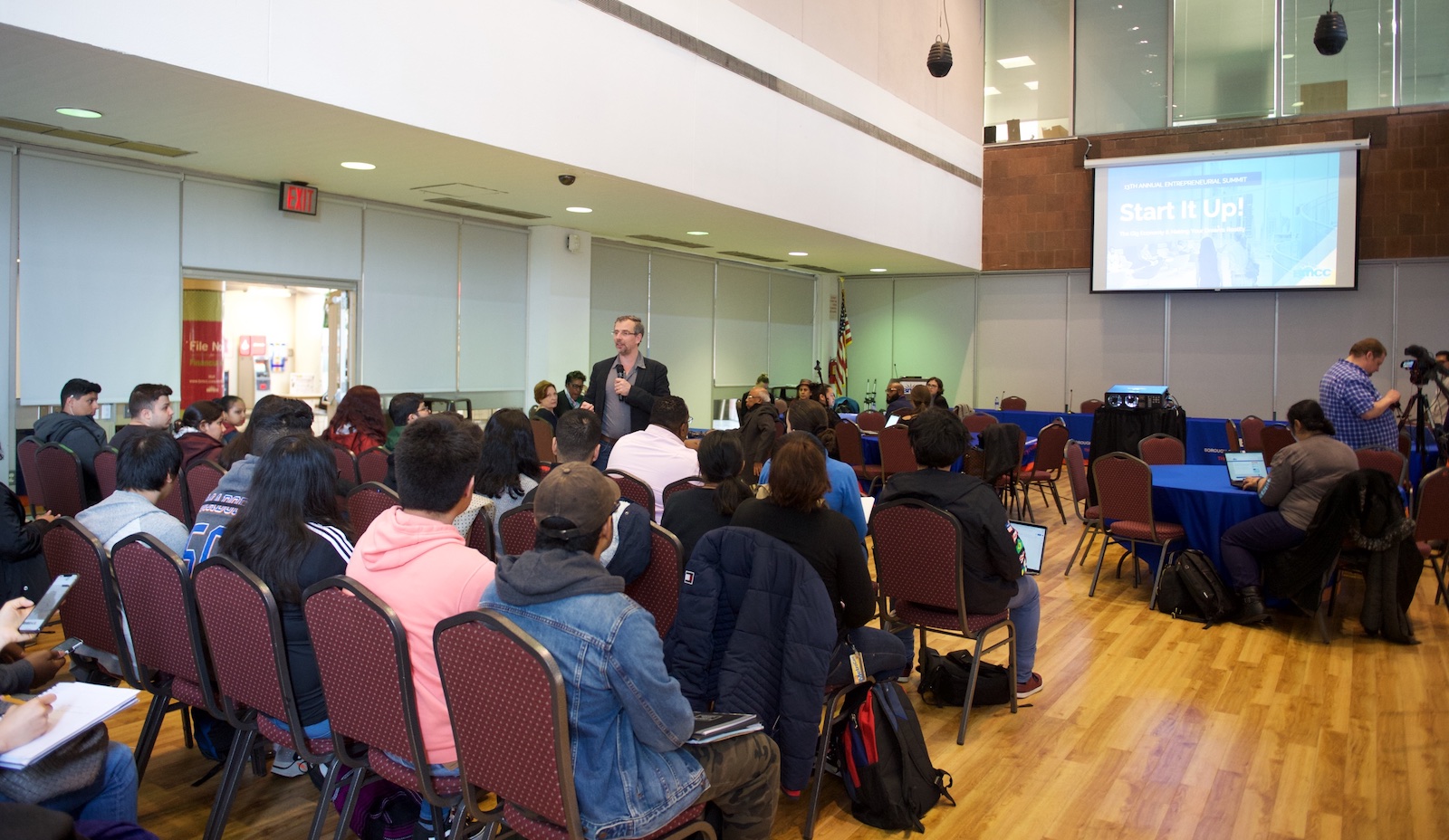
October 1, 2020
The Borough of Manhattan Community College (BMCC/CUNY) Small Business and Entrepreneurship (SBE) program has received a $363,260 Knowledge Challenge grant from the Ewing Marion Kauffman Foundation. SBE Professor Roderick Shane Snipes, who is deputy co-chairperson of the Business Management Department is Principal Investigator for the project.
The Inclusion in Entrepreneurship Research grant will fund the BMCC Citizen Entrepreneur Explorers Program. Students will study and collect data and other information on small local businesses in their own neighborhoods. The data they gather will then be uploaded to the project’s website. Based on research-as-education methodologies and project-based learning, the program will train business students as entrepreneur explorers in their own communities. Preparation for the program started this fall with a program launch set for Spring 2021.
BMCC is the only community college among 13 institutions across the country to receive a Knowledge Challenge grant. BMCC, along with New York University, The New School and Cornell University are the four institutions in New York to receive the funding.
“We at BMCC are deeply grateful to the Ewing Marion Kauffman Foundation’s for this Knowledge Challenge grant,” said BMCC Provost Erwin Wong. “The decline in entrepreneurship in recent years is a concern for all of us, impacting our city’s economic growth and productivity. This project is a critical undertaking by the Business Management department in improving our understanding of this trend while also providing our students with invaluable research opportunities.”
Research shows there is a need to contribute to an economic model that infuses entrepreneurship into the economy and removes socio-economic barriers to starting and growing businesses.
“The grants under this Knowledge Challenge are focused on inclusion and the importance of answering questions about the relationship between entrepreneurship, economic opportunity and mobility,” said Sameeksha Desai, director of Knowledge Creation and Research at the Kauffman Foundation. “We’re excited to learn from the research collaborations that are investigating this nexus, as well as to a more inclusive research pipeline that will continue to push us forward. As we all struggle with the very serious effects of COVID-19, we need research that informs our way forward, not to go back to how things were, but to achieve a more resilient and inclusive economic system that serves all of us in the future.”
With enrollment of nearly 26,000 students, BMCC is the largest of the 25 institutions comprising CUNY. BMCC’s diverse student population represents all five of the city’s boroughs and beyond.
“BMCC SBE students have direct access to some of the most economically challenged neighborhoods in New York City,” said Snipes. “The students will study businesses in the neighborhoods where they live in New York City for at least 48 months.”
The project’s findings could result in a better understanding of untapped neighborhood entrepreneurial ecosystems, according to Snipes. He also says the project could lead to more entrepreneurship opportunities for the students working on the project.
Central to the program will be the Citizen Entrepreneur Explorers website which will provide a portal to a catalog of supported projects, a toolkit to assist practitioners with designing and maintaining their projects as well as a gateway to hundreds of practitioners and coordinators. The program will train business students as entrepreneur explorers in their own communities.
In addition to researching the entrepreneurial ecosystem in their own neighborhoods, the students will build cultural competency—the ability to understand, communicate and effectively interact with people across cultures— and be seen as experts about their neighborhoods according to BMCC Business Management Chairperson Mahatapa Palit.
“This role as an expert and the pro-social values that it would kindle will give them a strong self-identity,” said Palit. “We will learn from them, as much as they will learn from us and that can be empowering.”
Central research questions include: Which local entrepreneurs are the most successful in 15 communities where poverty is the highest in New York City? Why are these more successful than others? How can this research be presented in the most engaging way back to the communities? How does student entrepreneurial self-efficacy change through this research process? How does empathy change through the Citizens Entrepreneur Explorers initiative?
Student researchers will access various demographical statistics such as how many different ethnicities are represented in a particular neighborhood. They might then examine some of the psychological factors that motivated an entrepreneur to start a business. How did culture impact the business they started?
“They could do quantitative analysis as well,” said Snipes. “Students could reach out to local businesses and seek to better understand business models and costs such as rent, overhead expenses and other factors.”
Snipes says by making the research hyper-local and focused on the neighborhood where they live, this provides a new way for students to relate and engage in entrepreneurship information and concepts.
“The second piece is to build a pipeline of researchers, people who understand what it is to do research around entrepreneurship,” explained Snipes. “And, because we are such a diverse population in the United States, the goal is to help fill that pipeline with a diverse group of scholars such as the population we have at BMCC. We want to cultivate them to be early scholars of entrepreneurship.”
- Grant will fund BMCC Citizen Entrepreneur Explorers Program
- Program will study and collect data on neighborhood businesses
- Data will be uploaded into a project website

